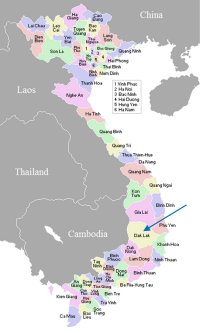|
|
|
|
 |

|
(please click to enlarge)
|
Located in the Central Highlands of Vietnam, Dak Lak Province is characterised by large forest and agricultural land areas and its native ethnic population, e.g. Ede, M'nong and J'Rai. Since the country’s unification, the Province has seen remarkable economic development, spurred by a booming coffee market and the introduction of other cash crops, e.g. rubber, pepper and cashew. Today, Dak Lak is the main coffee producer in Vietnam and a major supplier on the world markets.
Beside the conversion of large forest areas into agricultural land, the economic growth was accompanied by a rapid increase in population. This was initially due to a Government resettlement programme that aimed to provide the required agricultural labour force. At the same time, the economic opportunities increasingly attracted an uncontrolled in-migration from lowland Kinh-Vietnamese and other ethnic minorities from the northern regions of the country. The ethnic groups tend to move to more marginal and less productive lands on the upland slopes to practice their traditional shifting cultivation. Decreasing fallow periods and more frequent clearing of forest lands severely accelerate the degradation of forests and soils. Aggravated by uncontrolled logging of timber, the resulting extent of deforestation poses a serious threat to the natural resource base which in turn is a key problem of poverty particularly for the ethnic minorities in the rural areas.
Since 2003, RDDL promotes the increased integration of the rural ethnic minorities into the economic development in the province. During project phase II, RDDL aims to introduce a needs-based public development planning which leads to a corresponding allocation of resources. The specific consideration of the requirements and socio-cultural background of the ethnic minorities is hereby key in the anticipated adjustments of the regulatory framework for rural development and the management of natural resources. The project will come to its end on 31 December, 2009 and will be handed over to the partner DPI.
|
 |
|
|
 |
|
|
 |
|
|
 |
|
|
 |




